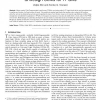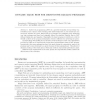158 search results - page 20 / 32 » Coinductive Logic Programming with Negation |
226
Voted
POPL
2006
ACM
16 years 3 months ago
2006
ACM
Functional programmers often reason about programs as if they were written in a total language, expecting the results to carry over to non-total (partial) languages. We justify su...
107
Voted
TC
1998
15 years 2 months ago
1998
—Many modern Field Programmable Logic Arrays (FPGAs) use lookup table (LUT) logic blocks which can be programmed to realize any function of a fixed number of inputs. It is possib...
145
Voted
ECAI
2010
Springer
15 years 3 months ago
2010
Springer
Abstract. The deployment of KR formalisms to the Web has created the need for formalisms that combine heterogeneous knowledge bases. Nonmonotonic dl-programs provide a loose integr...
139
Voted
ICLP
2010
Springer
15 years 6 months ago
2010
Springer
Abstract. Answer set programming (ASP) is a powerful formalism for knowledge representation and common sense reasoning that allows disjunction in rule heads and nonmonotonic negati...
150
Voted
ENTCS
2002
15 years 2 months ago
2002
In this paper, we develop the notion of fuzzy unification and incorporate it into a novel fuzzy argumentation framework for extended logic programming. We make the following contri...


